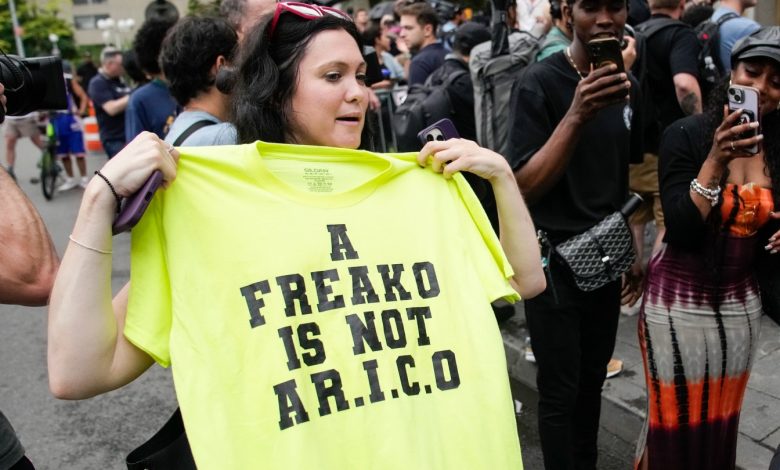What the Hell Happened With the Sean “Diddy” Combs Verdict?

The split verdict announced Wednesday morning in Sean “Diddy” Combs’ federal sex trafficking and racketeering trial — with Combs found guilty of two counts of transportation to engage in prostitution and acquitted of the more serious charges of sex trafficking and racketeering conspiracy — may have come as a surprise to observers who thought federal prosecutors had a sturdy case in which they laid out how the onetime high-flying hip-hop mogul used his corporation as a criminal enterprise to traffic women.
But now that Combs has been found not guilty of the more serious charges, he’s looking at a far less severe sentence, reduced from a potential lifetime behind bars to what could be mere years. What form his sentence will take and what’s next after he’s released (he was denied bail on Wednesday) are some immediate questions, but the burning one is more existential for those fighting for the rights of the abused: How the hell did this happen?
Given the shape Combs’ trial took and what is known about the jury’s deliberations over the past two days, one term has become somewhat ubiquitous: prosecutorial overreach. Last year, when Southern District of New York federal prosecutors announced the blockbuster indictment of Combs, the filing contained allegations that were surprising, as the theory of the case showed how Combs satisfied his sexual proclivities by using his company and staff as a means to traffic women, whom he dated for years. Then, as the government alleged, it was using a statute that was created to go after multi-member mob operations.
This concept of what his company truly was up to and that Combs and his employees conspired to these very specific and personal ends apparently just didn’t seem to fly with the jury, whose members had plenty of crimes to consider here. Elements of the RICO count were numerous, with some as plain as day, but it looks like the eight men and four women ultimately didn’t take any or all of the allegations into account because they probably saw it all as a bogus proposition. Last week, during closing arguments from the prosecutors, all of the elements and alleged crimes were mentioned: kidnapping (of Combs’ staffer, by force); arson, for the attack on Kid Cudi’s Porsche; repeated instances of drug distribution; and so on. RICO can be a tricky charge to prove and prosecute, and since it looks like it was not being bought by these men and women, all the government was doing for six weeks was shoving square pegs into round holes, then holding the end product up to the jury’s face. It’s not surprising that they all avoided eye contact with lead prosecutor Maurene Comey as the responded to the defense team’s closing argument.
Not that there weren’t some recent clues to how this would end. Now, perhaps the question jurors sent on Monday afternoon regarding drug distribution provides a small key to understanding how these deliberations played out over 12 hours. The jury essentially wanted to know if it counts if the person drugs are being distributed to had asked the accused distributor for them. With hindsight on how these 12 souls ultimately ruled on the racketeering charge, this query now sounds like the result of one juror trying to show another that Cassie and “Jane” willingly (as far as the juror may have been concerned) took drugs that Combs and his staff procured. And doesn’t that question on Monday afternoon seem to indicate that jurors — perhaps not all of them, but enough to convince the rest — weren’t buying it when Cassie and “Jane” told the court of coercive control and not being able to escape the hellish cycle of “freak-offs” and hotel nights. And that, it would seem, indicated a total lack of faith in the premise of the entire RICO case against Diddy.
Of course, it wasn’t just “overreaching” federal prosecutors who saw the Diddy case as a racketeering and sex trafficking play. Many believed it was a cut-and-dry example of a mob-like enterprise with many parties working toward the kingpin’s nefarious endgame. But Combs’ defense team played into these doubts with its relentless cross-examinations that veered, at times, into bullying (which Judge Arun Subramanian and prosecutors certainly pointed out). Women’s rights attorney Dr. Ann Olivarius, founder of international legal firm McAllister Olivarius, says those charges can fall victim to cultural baggage around stereotyping.
“I am surprised the jury acquitted Sean Combs of the most serious charges of sex trafficking and racketeering, which I believe the evidence supported. But labels like ‘trafficking’ and ‘racketeering’ carry powerful cultural baggage — images of poor foreigners locked in basements or shadowy crime families,” Olivarius said in a statement on Wednesday. “Combs’ actions — though violent, degrading, and in my view, clearly within the legal definitions — didn’t match those stereotypes. That disconnect gave the defense room to manipulate the narrative, and it worked.”
Or, as New York Law School professor Anna Cominsky put it, “the criminal enterprise was the weak spot and the jury didn’t buy it.”
Jurors also didn’t seem to buy the idea that Ventura and “Jane” were absolute victims of Combs because of their participation in and expression of excitement about his “freak-offs” or hotel nights. In court, prosecutors questioning them had an uphill battle in convincing a jury of New Yorkers that the women were drained of agency by Combs. Doubt over their testimony and the evidence presented, which did show gleeful texts to Combs, only hindered their ability to see the scenario as an example of coercive control, as prosecutors do .
Then there’s the question of the mysterious Juror No. 25. What role did this 51-year-old Manhattanite play during the 12 hours of deliberation? What happened in the first of those 12 hours that led the jury to send a note to the judge, suggesting that this peer of theirs needed a talking-to from Judge Subramanian? And how did the jury go from the suggestion of being hopelessly deadlocked when they went home on Tuesday night to having a unanimous decision on the racketeering charge within an hour the following day?
This should soon be public knowledge when a juror decides to speak out, which seems inevitable. Until then, one can only look at the notes and questions these 12 men and women asked about and theorize about how an unexpected conclusion to a truly sensational trial came to be. Plenty to contemplate ahead of Combs’ sentencing, set for Oct. 3.
Source: Hollywoodreporter
HiCelebNews online magazine publishes interesting content every day in the celebrity section of the entertainment category. Follow us to read the latest news.
Related Posts
- Eric Kripke Reveals ‘The Boys’ Season 5 Has Wrapped Filming, Teases Impending Series Finale
- 50 Cent, Kesha, Aubrey O’Day and More Stars React to Diddy Verdict: “The Cultural Weight of This Decision Is Immeasurable”
- Sean “Diddy” Combs Denied Release on Bail After Mogul Was Acquitted of Most Serious Charges
- MLB on Sling TV: Here’s How to Watch Major League Baseball Games Live Online Without Cable
- 'Maa'
Jio Studios/Devgn Films
Share on Facebook
…





